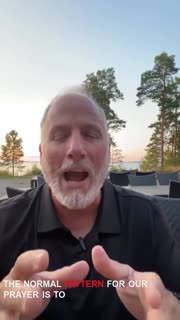The little studio that we have in my back garden on the west coast of the United States. But I'm speaking to you with a beautiful lake behind me. That's Lake Hjelmaren here in central Sweden. I'm here at a place called Hjelmagården, which is near a town called Leppe, I believe.
And we're here for a Calvary Chapel Scandinavia conference. I've been coming to these Calvary Chapel Scandinavia conferences for a long, long time, since the late 1990s. And for the last, I don't know, six, seven, eight years, we've been having them here at this wonderful conference facility.
With the sun setting behind me, and we're here out on a patio area, I had to leave our evening meeting a little bit early. I taught there this evening. We're making our way through the Book of Galatians. We're going to be talking about the Book of Galatians through this time. I taught there this evening, but now they're having a time of worship, a time of prayer for one another, a time of just response and waiting on the Lord.
As they're doing that, I stepped out here to be with you at what is 12 noon west coast of the United States time. It's nine o'clock in the evening, 2100 here in Sweden. So anyway, thank you for joining us today. I'm so pleased that you could be a part of today's event.
Live question and answer program. Today's lead question comes to us from somebody very dear, actually from Guna. All right. Here's the question from Guna. She asks this: In the Bible, particularly in the Old Testament, we see God addressed in different ways: Lord, Lord, with all capital letters, God, Yahweh, I Am, and others. What are the differences between these, and why is one used in one place and not in others?
Well, thank you, Guna, for this question. Okay, I'll be honest. Guna is my mother-in-law, and we were discussing this question the other day, and I thought that's a question so good we should save it for our question and answer time.
Yes, there are three notable names or titles used for God in the Old Testament. I say three notable ones because there are many, many titles and names for God used throughout the Old Testament, and each of them has a wonderful and important significance. There's really no doubt about that.
But these three main ones are, let's just say them according to the Hebrew, because we're talking about the Old Testament scriptures here, the Hebrew scriptures. We're talking about Elohim, which is normally translated God or gods. We have the covenant name for God, Yahweh, or Yahweh, that's normally represented in most Bibles by Lord in capital letters, either all capitals or what we call small capital letters.
And then we have Lord, usually written just with a single L as a capital or sometimes all in lowercase. That represents the Hebrew word Adonai. There are some wonderful passages of scripture where all three words are used at once.
Okay, this is a little rough around the edges, but I'm going to do a very primitive form here of PowerPoint for you guys. Ready? I'm just going to put something on a screen here. Here's Psalm 38, verse 15. Ready? There it is. Oh, is it appearing backwards on the screen? I guess this isn't doing any good, is it?
Here's Psalm 38, verse 15: "For in you, O Lord, I hope; you will hear, O Lord, my God." Here it is backwards on the image, if you're interested in seeing it. Again, "For in you, O Lord, I hope," and "Lord" is in all capital letters. "You will hear, O Lord, my God."
What's wonderful about that verse is that it uses all three of those names for God. "For in you, O Lord," that is Yahweh, "I hope. You will hear, O Lord," that is Adonai, "my God," Elohim.
Now, again, even though it's backwards on there, you know, I should have thought of that ahead of time. This is an example of using these three Hebrew words all in the same verse.
Now, "Lord" in all capitals, that's translated from the Hebrew word Yahweh or Yahweh. That's how most scholars believe it's pronounced. That refers to the name of the covenant God of Israel. Then there's "Lord," translated Adonai. That's basically the ancient Near Eastern word, ancient Hebrew word for a master, or we would think of it as in old English, the Lord or the person governing over the manor.
Most of the time, it's used in reference to God, but there's plenty of times in the Old Testament where it's simply referring to a king or someone in authority over somebody else. And then the third term is Elohim. That's God. And actually, it's the plural form of God. Elohim, speaking about God in the multiple.
Now, when it's used of Yahweh, the covenant God of Israel, that multiplicity not only implies a greater dignity, but it's also a brief reference, you could say, to the fact that God is one God in three persons.
Let me give you another example of this. Psalm 35, verses 23 through 24 says this. There it is right there. The verse: "Stir yourself and wake to my vindication, to my cause, my God and my Lord; vindicate me, O Lord, my God, according to your righteousness."
You see what I'm trying to communicate to you is here again. We have multiple uses of these names for God just within two verses. So in the phrase "to my cause, my God," that's using the term Elohim. "And my Lord," that's using the term Adonai. And then he says, "vindicate me, O Lord." And you can see there that that's indicated by all capital letters. That's representing the word Yahweh or Yahweh.
Then he says, "O Lord, my God, my Elohim, according to your righteousness." So, again, it's pretty simple when we're talking about "Lord" or "Lord" again with every letter capital or maybe in what we call the letter capital. It's called small caps. That's a reference to Yahweh.
When it's talking about "Lord" or sometimes written all in lowercase, that's referred to Adonai. And when it's written "God," that's a reference to Elohim. Sometimes that's translated "gods," depending on the context.
Now, it's important to understand, and I put it in that note there below, that each of these may refer to any of the persons of the Trinity. It's a mistake to think, for example, that Yahweh is only God the Father, or Adonai is only God the Father, or Elohim is only God the Father.
No, any one of these terms may refer either to the entire Godhead, the God who is one, or may be used in reference to an individual person of the Godhead: God the Father, God the Son, or God the Holy Spirit.
Now, we kind of understand the basic idea of this word God, the idea of a deity. And Elohim being in the plural, it has that sense of God's plurality, God's greatness. And it's a sort of hidden reference to the Trinity, if you will.
Adonai simply has the sense of master or Lord in that sense. But what about the name Yahweh? You know, there's an interesting connection we can make with that word. Yahweh in the Bible, I think in some ways it goes back to God's revelation of himself to Moses in Exodus chapter 3.
You remember the whole Moses at the burning bush occasion. Well, when Moses asked God, "Tell me who I am, who you are, so that I can declare myself and explain to the people who you are," then God said to Moses, "I am who I am."
Now, that might seem like a nonsensical reply to you: "I am who I am." Yet, in that phrase, one of the important things that God is communicating with "I am who I am" is that he has no equal.
And according to some commentators, whom I would agree with, that phrase, "I am who I am," is connected to the name Yahweh. Here's a quote from a Bible commentator named Cole. In his commentary on Exodus, he says this: "This pithy clause, I am that I am, is clearly a reference to the name Yahweh. Probably, Yahweh is regarded as a shortening of the whole phrase and a running together of the clause into one word."
So, one of the real meanings behind that personal covenant name for God, Yahweh or Yahweh, is that God has no equal. He's the God who is what he is, the God without equal. No one can stand beside him. You can't say God is equaled by anything or anyone.
Now, in Moses' day, Yahweh was not a new name or an unknown name. Yahweh appears more than 160 times in the book of Genesis. However, God was calling Moses back to an emphasis, the emphasis of something that had been forgotten in Israel: who God was in his covenant name.
And one more thing about this idea of Yahweh is that in the English-speaking world, for a time, this name Yahweh or Yahweh was pronounced as Jehovah. That's because the very pious Jews of later years did not want to pronounce the name of God out of reverence to the name.
Hi. Do you want to say hi to everybody? Give a greeting. That's our brother from Greenland. Welcome. Thanks.
All right. Wonderful. That's the first time you're saying it. That's right. There you go. See? Here we are, live. Hi, Christians. Q&A. I'm explaining to everybody some of the meaning behind the word Yahweh.
How for a time in the English-speaking world, it was pronounced Jehovah. But really, that was based on a misunderstanding by taking the consonants from the word Adonai and inserting them into the four letters that make up the word Yahweh: Y-H-W-H. If you do that, then you get Jehovah.
But if you pronounce it as they did in the days of the Bible, that's the covenant name of God, Yahweh or Yahweh. So, again, Guna, that's a very important question that you've asked and one that I think is important for us to understand: that God can't be represented by just one name.
He's so great. He's so majestic that just as in the modern world, kings can be given many, many titles, so it is that God can't be comprehended by just one title. Elohim, the word for God, that's sort of the generic word for God. And in the multiple, it refers to God's majesty.
But also, it's sort of a reference in some ways towards the fact... Then there's Adonai, which refers to God as master or Lord. Then there's Yahweh, which is his covenant name. And each of these are presented for us and represented in the Bible.
So, that's the lead question. Now, I'm going to go on and take questions that come to us from our live chat. So, our moderator is forwarding these questions to us.
So, here's a question from June, who's been watching on the live chat on YouTube. And June asked this question: My question is, why are some churches saying it's wrong to replace the Hebrew name Yahweh with the word God and Lord? They use the passage in Acts chapter 4, verse 12, saying that there's no other name under heaven given to humanity for salvation, except the name Yahushua.
They are using Yahushua, Halamekeshah, Yehovah, Dim, the Jews. And then... And Yahushua, believers. For them, the words God and Lord and Jesus should not be used. Thanks from the Philippines.
Okay. Well, June, let me see if I can help correct and give some clarity to that. This is the glorious thing about Christianity. It's that Christianity is a religion that was always intended to be a global religion and not restricted to just one language.
You know, it's not that way with Islam. In the religion of Islam, Muslims believe that the scriptures are only true and valid, that you only have a proper Koran in Arabic, and that that's really the language of the Muslim faith. It's not like that in Christianity.
Christianity is a religion that God always intended to go out to every tribe and tongue. That phrase is used. That means... It means that God gives open permission for us to translate the Bible, its words, its names into other languages.
You're not more spiritual for pronouncing the name of God or the name of Jesus in a Hebraic fashion. Now, look, if you want to, you got full liberty in Christ to do so. Go right ahead. There's no harm in it by any means.
But don't think you're more spiritual, that you're more right with God because you take those names and pronounce them in a Hebraic fashion. No, the glorious truth of the gospel is this: that God always intended his word, his truth, the faith in Jesus Christ, the salvation of Jesus Christ.
Remember, Jesus Christ is the savior of the world, and that includes every tribe and every tongue. So, for me to say the name Jesus, I'm saying it with English vocabulary and English pronunciation. That's absolutely fine before God. There's no problem with it.
I suppose that somebody could feel that they're more spiritual if they say Yeshua or Yehoshua or something like that. But it's not before God. You can pronounce it any way you want in other languages as well, as long as you're referring to the true God of the Bible.
So, June, thank you for that question. And don't let anybody put that out on you, that there's only one language with which we can properly communicate with God. No. God, from the very beginning, has intended that his word and his salvation would go out to every tribe and tongue.
Hey, along those lines, let me just say, for those of you who have been joining this live YouTube Q&A late, I'm not at my home on the west coast of the United States. I'm here by beautiful Lake Hjelmar here in Sweden. I'm at a campsite, camping center called Hjelmagården, and it's outside this town of Leppe, I think the name is town. Vinokur is the closest larger town.
And here in the middle of Sweden for a Calvary Chapel Scandinavia conference. But while I'm here, I've got a phone, I've got a microphone, I've got my resources here. Why can't we just do the Q&A here, which is exactly what we're doing.
So, we're taking your questions that come in on the live chat. Here's how it works. You give your questions, our moderator looks them over, and he forwards unto me the questions that are either relevant to the lead topic; those get first priority. But then also questions that would have the widest appeal to our audience.
Next question comes from Tirish, who asks, "Hi, my name is Tirish, and I'm from India. Actually, I'm a big fan of your website. Whenever I read the Holy Bible and have some doubt, I use to refer to your website, since it contains a detailed description of each verse. Ever since I started reading my Bible, I have a big doubt in my mind: whether or not Jesus Christ is the real God who incarnated as human to earth. Is Jesus Christ and the God created the universe, we call him Yahweh, the same? Because Jesus never claimed that he is God and all the people should worship him. Then why do we worship Jesus Christ? Could you please clear my doubt on this matter?"
Well, Tirish, I'm happy to do that. First of all, I want you to know that Jesus did claim to be God. He claimed, number one, to be equal with God with such radical statements such as, "I am the way, the truth, and the life. No man comes to the Father but by me."
Tirish, could you imagine any prophet in the Bible saying such a thing? No, that's something entirely different that Jesus and Jesus alone could say. But then again, we also have remarkable statements from Jesus such as, "I and my Father are one."
That there was a difference between the Father and the Son, but no separation between the Father and the Son. Jesus was just like God the Father. Jesus also is very plainly declared to be God in the scriptures. John chapter 1, verse 1: "In the beginning, the Word was God, and the Word was with God, and the Word was God." A very powerful statement.
So repeatedly in the scriptures. And as far as receiving worship, there were several occasions in the scriptures, in the gospels where Jesus received worship, including when he received worship from Thomas in John chapter 20. Thomas said directly to Jesus, "My Lord and my God." And Jesus did not correct him.
So there are many occasions where Jesus received worship, where he said that he was God. Now look, don't get yourself into the bind of thinking that Jesus had to say it in a particular formula for it to be valid. No, no, no. Jesus said that he was God in many different ways.
And if people say, "Well, he didn't say it with the words I wanted him to say it," look, Jesus isn't your lackey. He's not your slave. We're to serve him. And Jesus is welcome to tell us who he is in any way that he pleases.
But there's no doubt that Jesus referred to himself in terms of deity. How about this one from the Gospel of Matthew when Jesus said, "Heaven and earth will pass away, but my words will never pass away." What a dramatic statement of deity that was.
So, Tirish, look, I respect you for taking a look at the Bible and saying, "I really want to understand it." And I want to know for myself what it says. But don't put yourself into the trap of thinking that unless Jesus declares his deity in a formula that's pleasing to you.
And I'm not trying to be personal with you, because many people say this, that's the only way that you would regard Jesus as God. Jesus declared himself to be God on many occasions, and we should take that and appreciate that.
He declared that only God has the power to forgive sins, and then he forgave a man's sins publicly and demonstrably. So again, thank you. I'm glad that you use the commentary. I'm glad that it's helpful for you.
Look, if you don't know, I'm talking to you, our listening audience. I've got a verse-by-verse commentary on the entire Bible that some people find helpful. And so maybe you'll find it helpful. You can find that commentary at EnduringWord.com.
Hey, I got somebody coming up who wants to come and say hi to everybody. OK, Magnus, here's a microphone. Yeah, I'm going to turn it on. Let me make sure it's on here. Yes, we're on. You can just hold it right there. Kind of, you know, up there, right there at the top.
OK, is where it comes from. Yeah. And then let me turn this a little bit here to get you in our picture. Hey, everybody. This is Magnus.
Hello, everyone. OK, Magnus, you pastor a Calvary Chapel work in Høvde. Yeah, here in Sweden. Yes. It's not very far from here. How far is it from where we are here?
It's like two hours driving. OK, two hours drive. And again, you pastored that work for quite a while now, several years. Four years. OK, four years.
And again, I'm sure there's some days when it's thrilling and a great privilege to do. Other days, probably it feels like more of a responsibility. But would you say that Sweden is an easy or a difficult place to plant churches and to do Christian work?
Yeah, I really think that is a phenomenon here in Sweden that many times people are so apathetic that they don't even really oppose Christianity. Yeah, they just don't care at all. It just seems completely irrelevant. It's a very secular society.
Yes. OK, now at the church that you pastor, what are you teaching through in the Bible right now? First Timothy. OK, First Timothy. That's sort of a challenging book.
Isn't that a wonderful thing? I can speak for that as a pastor. How amazing it is to feel like the Holy Spirit is really God. He's guiding you in what particular book of the Bible to focus on at any particular time.
Yeah, that's an amazing thing. Yes. Well, Magnus, anything else you want to say to our audience here?
There is some possibility because at the end of the millennium in Revelation chapter 20, I believe. Yeah. It does describe the nations and Gog and Magog gathering together, whether that is the battle referred to or not, or whether it's a separate thing, that's something that people debate over.
Yeah. Yes. Well, you will say, I will go up against a land of unwalled villages. So that's pretty... Well, that is very interesting and would be kind of the atmosphere that would help fulfill what's spoken about right here, that they have this confidence.
Oh, we don't have to worry about anything. We're protected. We're OK. And then here, what you're talking about is in Ezekiel 38, that's exposed as being not correct. And it's only the Lord that saves them in the end.
I like that, Magnus. I think that that's helpful there. Nobody rescues them except the Lord. Yes. OK. That's fantastic. Thank you very much.
Thank you, man. I appreciate it. OK. Bless you. Bless you all. Thank you, Magnus. Thank you.
Oh, you're welcome. You're welcome. I appreciate that. Fantastic. Wonderful, Bill. I appreciate that. Amen. Amen. Thank you for that.
You know what? I'm doing kind of a live broadcast right now. OK. So let me do this. I'll get you as soon as afterwards here. Thank you, Bill. I appreciate it.
OK. Let me keep on going here to these questions that have come in here. Here's one from... Hold on here. OK. Tirish. Tirish. Next question comes from Rollingwith7.
Ask this question: When Islam refers to Allah, is that considered the same God as Yahweh? And if not, do Muslims believe it is?
OK. I'll tell you what... I'll tell you what my... What the translator of our commentary into Arabic has told me. She has told us... And she's not... She's more the general editor than the translator.
She has told me that Allah is the generic word for God in Arabic. Now, the Allah that's presented in the Quran is not the same as the God of the Bible. Yet the word Allah is the same as the generic word for God in the Arabic language.
So that's the way I would simply put it. The God that's presented in the Quran, Allah, that is not the same as the God of the Bible. That is not the God of Abraham, Isaac, and Jacob. However, Allah is the name of God as presented... Not the name of God. It's just the generic word for God in the Arabic language.
That's the best way that I would put it. Thanks for that. OK. Next question comes from Deborah, who asks, "When we pray, who are we addressing? Father, Son, or Holy Spirit?"
Well, I think that's a very commonly asked question. And I can give you a normal pattern without being, I think, legalistic or hung up on this. And the normal pattern is simply this: Is that the normal pattern for our prayer is to pray to God the Father through the mediation and in the name of God the Son, Jesus Christ, empowered and led by the work of the Holy Spirit.
That's the normal pattern for prayer. And we see that pattern presented a few times in the scriptures. However, let's always remember this: God the Father is God. God the Son is God. God the Holy Spirit is God.
I mean, I'm stating things that are obvious and true. But what we need to remind ourselves from this is simply that it's not wrong to pray to Jesus. It's not wrong to pray to the Holy Spirit.
Now, I would think it's of concern if somebody was sort of hung up on these things. They would only pray to Jesus. They would only pray to the Holy Spirit. Again, I think the normal sort of regular pattern is to pray to God the Father through the mediation of God the Son and in the name of Jesus Christ, God the Son, and empowered by and directed by God the Holy Spirit.
But to realize that it's not wrong to worship any member of the Trinity. It's not wrong to pray to any member of the Trinity. Thanks for that question there, Rollingwith. Or actually, Deborah.
Next question here comes from Buying Space. Ask the question: Do Swedish people feel being Christian is opposition to science?
OK, Buying Space. Look, I'm not going to present myself as some kind of expert on Swedish culture. Even though, look, I mean, I've had kind of regular contact with Sweden and Swedish culture for more than 40 years based on my marriage to a Swedish woman.
But I think that they think Christianity is more at odds with simply the modern world. Kind of a common reaction among some Swedes is to simply, when they find out somebody is a Christian who really believes the Bible, they can be... Again, not all, but some of them can be kind of startled. Like, "Wow. There's still people who believe that?"
They kind of think it belongs just to medieval times. So I think that more generally, Swedes would think that Christianity is simply inconsistent, incompatible with the modern world.
Now, does science play a role in the modern world? Absolutely. Positively. There's no doubt about it. But it's neither is it a case where they think of it specifically in terms of just science. I think it's broader than that.
So I think that's the general approach. Sweden, again, is a very secular society. And you see that reflected in many, many ways. And that's why I so appreciate my brothers and sisters here who are doing a good work for the Lord and are just honoring God by planting churches, by serving churches, by faithfully serving congregations.
Sometimes quite small congregations. Sometimes wonderfully growing congregations. So that's a great blessing and a great gift.
OK. So, next question. We'll come up in just a moment. How about this? Do you want to have a seat? Do you want to say hi to people? You hold that microphone. And that will be your special microphone.
Hello. I butchered the name of the lake behind us. Hjelmar? Hjelmaren. Hjelmaren. And the place we're at?
Yeah, Hjelmaren. Hjelmaren campground. And it's near the town of Leppe? That's a little village. But we are... You'd say, Vinokka?
OK. Yeah. Was it beautiful? Yes, it was beautiful. I know. I've had my back to it the whole time.
OK. One thing I do got to say, it is Ingelo's birthday today. Yeah. Happy birthday, sweetie. Thank you. That's right.
Yeah. Thank you very much, dear. All right. Bye-bye. All right. Best part of the Q&A right there.
OK. Next question comes from Zibone, who asks, "The first mention of the word Lord in the Bible is when God breathed his breath of life into the lifeless form of Adam. Can we attribute the name Lord to an intimate God, to humanity? Is there more significance here?"
Zibone, I just want to do a quick check on that reference that you made to Lord being a reference to there in, let me just go to that in my Bible, go to Genesis. Genesis 1 here, and then look for God's creation of man, breathing the breath of life, and the Lord God.
OK. Yes, you're exactly right there. There in Genesis 2, verse 7, is that first use of Yahweh in the Bible. And your question is simply this: Can we attribute the name Lord to an intimate God, to humanity? Is there more significance here?
Well, I think there is some significance in that, because Elohim, translated God, or sometimes gods, is a generic name for God. It's very commonplace. Adonai, sometimes translated Lord, not in capital letters, that is also just sort of a reference to a master, a lord, a boss, if you want to say it, a chief.
But then there is the word God. There is the word Yahweh. And Yahweh is a relational name between God and his people. You could say that it's the covenant name of the God of Israel.
You know, the pagans had their gods. The Canaanites had Baal. The Egyptians had Ra, and Osiris, and Isis, and all these other gods. The Moabites had Milchom, and other gods.
Well, the covenant God of Israel, the God who actually is the creator of heaven and earth, this is Yahweh, or Yahweh. And in that sense, it's a relational name. It refers to God speaking of his covenant.
So, if you're trying to make that connection between the first reference to Yahweh in the Bible, being in Genesis chapter 2, verse 7, when God breathed life into Adam, I think that's a valid connection there.
So, thanks for that observation. And yes, I do think there's a connection. Next question comes from A. Quint, who asks, "Dear Pastor David, thank you for your ministry. It builds up my life. Today, I have two questions about the face of the Lord. In number one, in Exodus 31, it says that no one can see it, but I've watched countless testimonies of people who died and went to heaven and back to life, and were looking at the throne of God and or Jesus. What should be made of these?"
OK. Let me answer your question. First, I'll read your second question. A. Quint, I think you should be very skeptical of people's accounts of their visions and experiences of going to heaven, so to speak. I wouldn't give any regard to them, really, theologically speaking.
Look, it can be difficult to question somebody's experience. Somebody says, "I had this experience." What do you say? "No, you didn't." I mean, sometimes that's the case, but it can be difficult. It can be difficult to judge and discern such things.
But whether or not there's any theological importance to what they saw or experienced or think they saw or experienced, that's something I can speak to as somebody who knows the Bible. And I would just say this: that the Bible doesn't want us to run after such things.
I just don't have a lot of confidence in what people say when they've gone, when they purportedly they've gone to heaven and had some heavenly experience. And some of these instances have been demonstrated to be just outright fraud. And so that should make us very wary of such things ourselves.
So that's number one, I would say. And then secondly, can you say some things on spiritual warfare? No, excuse me. Number two, we've read in many verses that the Lord hides his face from us. What does that mean? Hiding his wrath. If so, are face and wrath connected and related?
OK, Quint, what you hear is you're talking about the use in Hebrew, biblical Hebrew figures of speech. The figure of speech used was to speak to somebody face to face, was to have an unhindered relationship with them.
So Moses never saw the face of God, but he had an unhindered relationship or less hindered than any man of his day. Had therefore it speaks of Moses in that way, having that face-to-face relationship with God again, it's using a figure of speech.
And I just want to remind you, we use figures of speech all the time. When we talk about two sports teams going head to head, we don't mean that they're going to butt heads against one another, that that's going to be somehow the contest. We mean that there's going to be just sort of a contest between the two.
So again, we use figures of speech in our speech, speaking all the time. Don't know, when something in the Bible is to be understood as a figure of speech, we are understanding it literally. We're understanding it according to its literary context.
And that's what it means to understand things literally, at least in a biblical context. So, for God to hide his face from us means for God to display in some way his displeasure, to obscure himself, to hide himself from us.
And again, that would be some element of God's displeasure, sometimes discipline, sometimes wrath upon his people. That's the best way I would explain it there.
All right. Next question comes from Ken G, who asks, "Can you say some things on spiritual warfare? I rarely, if ever think about that stuff, much less assume that it's the cause of something. But lately I've been a consistent pattern of one thing after another. I'm finally starting to think, oh, maybe it's spiritual warfare."
Well, Ken, when we read in Ephesians chapter six, those words from the apostle Paul that we wrestle not against flesh and blood, but against principalities and powers and forces of darkness in spiritual places, that sort of wakes us up to the understanding that there's more to our Christian life, life and existence to what we see around us that we live in the midst of a spiritual world that sometimes we just don't give adequate consideration to.
We live in a spiritual world and there are spiritual enemies that believers contend with. There are, if I could put it straightforwardly, and I hope this doesn't cause alarm to anybody because it's not intended to cause alarm, but I just want to say, there are demonic spirits that mean you ill, that mean you harm.
If you're a believer in Jesus Christ, if you're not a believer in Jesus Christ, they can still mean you ill, mean you harm. But there are demonic spirits that want no good for you whatsoever.
And contending against these principalities and powers and forces of wickedness in high places, that's all sort of biblical vocabulary for demonic spirits and angelic beings of different rank and of different dispositions.
There are times when we need to stand strong in the Lord and stand against any of their schemes, any of their wiles, trusting in the Lord and his strength. And when we carry out this, this resisting the devil and he will flee from you, that's God's promise in the book of James.
When we stand strong against it, knowing that he's a roaring, lying liar. He's also a liar, but he's a roaring lion seeking whom he may devour. When we stand strong against that, then we resist the devil. We turn back his schemes. We declare our trust in the Lord.
So look, I would just say to you very straightforwardly, Ken, if you feel like you're in this place where you feel there's a season of undue spiritual attack, then I would encourage you to pass in all the more read that wonderful spiritual warfare passage in Ephesians chapter six, meditate upon it and ask that God would give you the wherewithal to use the helmet of salvation, the belt of truth, the sword of the spirit, the shield of faith, the breastplate of righteousness, the shoes of the gospel of peace.
They're singing happy birthday to my wife in there. Anyway, Ken, I'm sure you can do that. And realize the reality of it. But here, let me give you one more illustration of the spiritual realm. Isn't that nice? I can see it here from the other room.
Anyway, again, one more piece of advice for you. Consider it like this, that someone who's snorkeling in a beautiful tropical place, they go underwater and they see a world that they never knew existed.
Now that world was there all the time. It didn't just come into existence when they... but they weren't aware of it or living in light of it. It's an analogy to the spiritual realm all around us.
We live in a realm. We live in a world that is not only material things, is not only flesh and blood, but we live in a world that has spiritual dynamics, spiritual beings, spiritual contention for us to deal with.
And so, I hope that you can take that seriously and see the Lord's victory won in these things in your life.
All right. Next question comes from Carrie, who asks, "Hi, Pastor David, do you believe Satan has the power to protect those who do his bidding from harm? For example, there have been people throughout history who have done terrible things yet evade harm for many years. For example, I think that there were 42 assassination attempts on Hitler. I'm interested to see here your views on this."
Well, Carrie, yes, I believe that that is certainly within the capability of Satan and his agents. That reminds you, Carrie, of this. And again, I'm sure you know this, but I'm doing this more for the benefit of our other listeners who may not be aware of it.
The care. I want to remind you that when we talk about dealing with Satan, we're really using what you might call shorthand. Well, we really don't believe, I don't believe that I've ever done battle with Satan himself.
Satan, Lucifer, the morning star, the fallen one, the devil, you know, the worst guy, so to speak, he's not omnipresent. He can only be in one place at one time.
Now, I do believe that I have dealt and you as a believer, you've dealt with his representatives, demonic spirits that are under his control. So it's not wrong for us to say Satan did this, Satan did that, as long as you just kind of understand that it's not him directly, but it's him working in and through his agents, through his agency.
So, but yes, do I believe that it's within Satan's power or capability to help preserve the life of those for whom he would like to do that? Yes, I do think that, although I need to give one powerful caveat here, let's remember that Satan is on a leash that ultimately he cannot do anything that is outside the broader will of God.
Whatever Satan performs, in some way or another, God has allowed. Don't ever lose that in your thinking. So we shouldn't think of like some omnipotent Satan, though he's very powerful, very powerful in deception, very powerful in his command of things, no doubt, but he's not omnipotent.
He's not equal to God in any way, of course, and Satan cannot do anything that God does not allow. And so we never want to lose sight of God's bigger power, purpose, I should say, even in what Satan is allowed to do. Thank you for that question there, Carrie.
OK, here's a couple of questions about Rahab from Andrea. Hey, Andrea. Hi from Sweden. Andrea asked this question: "Hi, David, how do you explain Rahab's faith in Joshua 2 would not only save her but also her family? Is this saving in a literal sense, salvation or both?"
Andrea, that's a good question. And I would say this: that I would say we can say that Rahab herself was saved both from destruction in the conquest of Jericho and she was saved by coming in and becoming part of Israel.
The rest of her family, all we can confidently say is that they were rescued from the destruction that came upon the rest of Jericho, whether or not they also came in. And she was saved by coming into the community of Israel.
I kind of think so, but it doesn't specifically say. But that idea of rescue or salvation can apply to either or to both of Rahab since she becomes part of the genealogy of Jesus Messiah and marries into the family of the tribe of Judah.
We feel very confident with saying that Rahab experienced salvation in both senses. She was spared the judgment and destruction that came upon the city of Jericho. And she entered into the covenant community of God's people, the people of Israel.
Her family, we're not quite as sure. I would lean towards saying probably, but we're just more confident about what it says regarding Rahab.
Then the next question comes again about Rahab from Christopher, who asks this: "In the Old Testament, Rahab was saved by welcoming spies. In the New Testament, writers praise Rahab's faith. Why are most characters mentioned or known by their sinful background if they have been saved?"
Christopher, you know, Christopher is asking a great question here. The Bible talks about Rahab and her faith, Rahab and her declaration of belief. And we kind of want to go back to saying Rahab, that prostitute, because that's how she made her living before she put her faith in Yahweh, the covenant God of Israel, and was incorporated into Israel.
And so, take a look at that, and we tend to think of her prior life as more notable. Rahab, the prostitute, maybe Rahab, the liar. But God sees her more as a woman of faith.
And here, I like the question that Christopher gave. Christopher Robles just basically said, "Why do we do that?" Christopher, maybe it's because we're just kind of dumb sometimes. Maybe we should pay more attention to the new men and women that God makes, rather than the old person that they used to be.
But maybe we're just so struck by the distance between what Rahab used to be and then what she became that we're really struck by that. But, Christopher, you got a great point there, or Christopher, I should say.
OK. Next question comes from Tunel Benon, Shugo Tre. Hello from Sweden. Hey there. How shall I answer my mother's atheist cousin when he says that homosexuality is natural?
Well, I would say you can answer in two ways. Number one, homosexuality is natural only if you take a very narrow view of what is natural. There is such a thing as some same-sex sexual conduct among some other species in the animal kingdom. That's true.
But none of it is procreative. None of it. And look, I really don't care about the sea slug from Madagascar that reproduces. I'm talking about the vast majority of the animal world can only reproduce with a male and a female.
That's what preserves and advances the species. That's what is pro-nature. Not any kind of same-sex coupling that they may have. So first of all, you can only consider it natural if you take a very narrow view of what nature is.
But then number two, and I think this is probably even more important, who cares? Listen, in the animal world, cannibalism is natural. Murder and killing is natural. There's all kinds of conduct among animals that we would never tolerate, and we should never tolerate among human beings.
Just because it happens in nature does not indicate in any way that it is good or advisable for humanity to carry out. So again, is homosexual practice natural? Well, number one, only if you take a very narrow view of what nature is.
And then number two, it doesn't really matter because there's lots of things in the natural world that we in no way should emulate.
OK. I've been communicated to by our moderator. We got a super lightning round in front of us here. I better take a drink of water. Christopher, did you hear that? We got a super lightning round. The moderator just sent me all kinds of questions, and I'm supposed to answer them really quick.
Right, here we go. Daughter of the King asks, "If someone votes Democratic, can they be saved? Also, is it wrong not to vote as a Christian?"
Daughter of the King, listen, I give a very wide latitude that people can be in error about things and still be Christians. No, voting for a Democrat, we're talking about the United States politics.
And many of our viewers, many of our listeners are not in the United States. But in the United States politics, we have two major parties, the Democratic Party and the Republican Party. She's asking, if somebody votes for a Democrat, can they be a Christian?
Yes. You can argue whether or not they're in error for doing that. And I think that's a great discussion to have. But yes, people can be wrong about a lot of things and still be Christians.
And the second question that she had is, is it wrong not to vote as a Christian? Let me say this: if a person does not vote as a Christian, they say, "I will not vote." I think their not voting should be purposeful.
In other words, they make a deliberate choice not to vote. To fail to vote just out of lack of concern, laziness, they said, I think that's ill use of stewardship that God gives to people in a democratic society.
I suppose there are some people who would refuse to vote out of protest. They would do it in a very purposeful way. But even then, they're doing something purposeful with their vote, even if it's in not voting.
By and large, I think that voting is a stewardship that God gives to people in a democratic society. And people should prayerfully and properly use that stewardship in a way that, even if it's in small ways, advance the kingdom of God.
All right, next question comes from Meg, who asks, "Hello Pastor David, have you ever spoken on KJV only-ism?"
Meg, not much, but I'll just say this: Look, I have no problem with people who are King James Version people preferred. And I know some people like that. They just prefer the King James Version. Fine, absolutely. I think there's good reason to prefer it.
I prefer using the New King James Version. But the King James only crowd, I think that they're mistaken. And I think that their effort and their time and their interest would be better put in other places.
Next question comes from Buying Space: "Should Christians use the Jewish calendar?"
No, there's nothing more spiritual in using the Jewish calendar. And I think you'd have a very hard time getting along in modern society if you only use the Jewish calendar.
Look, you're free in Christ. You want to use the Jewish calendar, knock yourself out. You got just don't think it makes you any more holy. Just don't think it makes you any more righteous before God.
Listen, the real curse are people who would use something like a Jewish calendar. Christians use the Jewish calendar and think that they're more holy than Christians who don't use a Jewish calendar.
No, stop it with that. There's no place for that.
OK, next question comes from Skip's mom. Can you tell me what Egypt represents in Moses, in Jeremiah, and finally, when Jesus went as a baby?
Well, Skip's mom, I don't think we're talking about this heavy allegorical thing. In Moses's day, Egypt was a great oppressor of the people of God, holding them in slavery.
In Jeremiah's day, Egypt was a false hope. In Jeremiah's day, the Egyptians sort of presented themselves as an alternative for Judah and Jerusalem to put their trust in instead of trusting in the Lord for rescue against the Babylonians.
And that was a false hope because it was never going to turn out good for them if they did trust in Egypt. That would be a forsaken hope.
And then finally, I would say in Jesus's day, Egypt was just a place of refuge because it was all part of the same Roman Empire. It was a fairly friendly place for Mary and Joseph and Jesus to go.
And there was a substantial Jewish community in Egypt at that time where Joseph and Mary could find a place to wait out the death of Herod.
So, I wouldn't look for a universal symbolic meaning that would connect. But rather, in regards to Moses's day, it's oppression. In regard to Jeremiah's day, it's a false hope. In Jesus's day, it's a place of refuge.
OK, next question comes from Cherry, who asks, "Why is it important to attend church every Sunday? Or why should we attend church every Sunday?"
Well, Cherry, the Bible says that ideally, Christians are part of a congregation, of a fellowship of other Christians. And look, I know that some people, they're unable to do this.
It just may be their health, maybe their life circumstances, where they live, maybe some problems that they've had with churches in their community, whatever it is. For some people, they're not able to do that.
But ideally, people are connected to a congregation. Now, that congregation doesn't have to meet on Sunday. If you are part of a weekly Bible study that worships God, that has order to it, where God's word is proclaimed and taught and studied, then maybe that's your church.
Maybe that's the gathering of believers that you connect to. It doesn't have to have a steeple on the building for it to be a real church.
There is no biblical command for Christians to meet on Sunday. If it works out better for you in a good meeting with other people another day of the week, then that can be your church.
There is a biblical command for Christians, again, I'm speaking ideally, for them to congregate with other Christians. Some people can't do that for whatever reason.
Gathering together, yes, that's part of the Christian ideal. But having it to do it on Sunday, well, that's not necessarily in the scriptures at all.
Next question comes from Sarah, who asks, "My aim is to be a Proverbs 31 wife. However, do I need to be a business owner?"
OK, Sarah, you're referring to those references in Proverbs 31 where it talks about the Proverbs 31 being a woman of business, of enterprise.
Sarah, it doesn't mean that you have to own your own business. It does mean that the ideal godly woman—and let's remember, Proverbs 31 is an ideal that's set forth.
Matter of fact, it's God's instruction to a young man as to what kind of woman he should look for. And I don't want to sound too strange about this, but when people are looking for a woman, for someone else to marry, they may not find somebody who checks every single box that they're looking for.
Maybe they find somebody who checks a lot of the boxes. So, that's what Proverbs 31 is. It's God's counsel to a young man as to what kind of woman he should look for.
And in doing so, it presents the ideal woman. Well, this ideal woman in Proverbs 31 is a woman of enterprise. She's a woman who goes out and conducts business.
And it just doesn't mean you have to open your own business. But maybe you just keep your eyes open around you for opportunities where maybe there's things that you can do good that you hadn't thought maybe before.
Thank you for that one, Sarah. Next question comes from Rita, who asks, "How can or what can I pray to help my son to not like the movies that are of horror? I hope you can answer me, thank you."
Rita, one thing I don't know in your question is how old your son is and what your relationship with him is. If your son is living in your home, if he's a minor, you really have the right to tell him what can and can't be seen and watched in your home.
And so, if it's that case, you can just say that directly. Now, if your son is older and no longer under your authority, so to speak, as being a parent in the home, then you can just simply tell him, "Son, I think this is what's best for you. This is my counsel to you. I think you should carry this out."
But when the son is out of the home, when he's no longer under your authority, then you're no longer in a place to command him to be commanded by you.
But maybe through your earnest appeal to him, through a mother's prayers, a mother's tears, that might have some great effectiveness. So Rita, for me to give a more specific answer, at the age of your son and your relationship with him.
And then a couple questions about deliverance. Number one, from Ashley: "Is there such a thing as Christian deliverance ministry? How can a Christian be re-delivered? If Christ has set them free, are they not free indeed?"
And then Janet asks a similar question: "Pastor Guzik, why do people go for deliverance? Kindly explain to me what deliverance is and why people attend the deliverance sessions."
OK, let me put it this way. Most of what goes on under the name of deliverance is foolishness.
Now, I'm not going to say all because people mean different things by the terms. Sometimes deliverance just simply means very pointed, directed, focused spiritual warfare. And that can be a very legitimate sense of, "Hey, I'm going to partner with this other believer, and I'm going to stand with them in spiritual warfare as they do exactly what James tells them to do: resist the devil, and have him flee from you."
Now, that can be an idealistic way that something that could be known as deliverance ministry could take place. But let me tell you this: most of what goes on under that title, deliverance ministry, is foolishness.
It's theatrics. It's yelling. It's shouting. It's wild gestures. It's crazy antics. It's all the rest of it. And that really is just a distraction. It has no place in what may be helpful and necessary, and that is directed, pointed, if you want to say, assisted spiritual warfare.
Hey, that's the only kind of deliverance ministry that I'm interested in. Coming next to a brother or sister and helping them do what the Bible says they can do: resist the devil, and he will flee from you. That's what it says in the letter of James.
We can stand strong against Satan and his deceptions. But sometimes it's helpful to have another brother or sister in Christ to stand with you and help you to stand.
So, I would just say this: most of what goes on under that name, deliverance ministry, is foolish theatrics. And the reference that you made, Ashley, in re-deliverance is sort of appropriate to exposing that foolishness.
This idea that, well, they got delivered, then they'd be delivered again, then they'd be delivered again, it kind of shows that there's no real deliverance going on.
And then for the last question here on our lightning round, here we are. Diptesh is asking, "If God had to choose between his glory and his love, what would he choose?"
Diptesh, I don't think there's any real answer to that question. I don't think there can be an answer. God's love and glory are vitally connected.
There's a real connection between the love of God and the glory of God. And so, they're inseparable. We can't take the attributes of God and separate them in that manner.
God is a whole. And what he is and who he does and what he does is connected to that whole.
All right, everybody, I'm about to sign off, but before I do, why don't I get up, turn around, turn the camera around, and show you some of this beautiful lake scene here at Vjelmeran.
Don't know if I said that right. I wish Ingelo was here to give you a better view here. OK, so here we go. I'm walking over here now, and you're gonna see a little bit of a beautiful sunset here, right here in Sweden, overlooking the lake.
Here we are. It's a beautiful scene. I'll give you a panorama before we sign off. Here we are. Isn't this beautiful?
So glad that you could join me today. Next week, I will also be in Sweden, but I won't be here by the lakeside. I'll be at another location on the west coast of Sweden.
So glad that you could join me today. Thank you so much for coming. God bless you, and hope to see you another time. Bye-bye.















